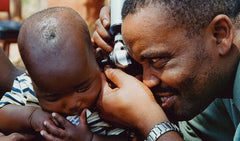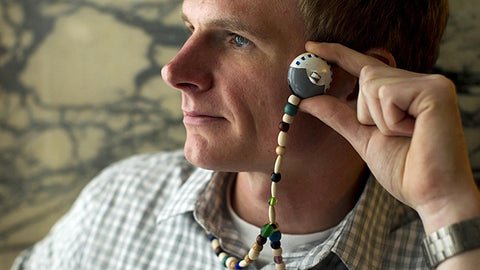 Hearing loss hits poorer countries hard—and the problem’s only getting worse. Innovative, low-cost hearing aids are a rising solution.
A whopping 250 million people around the world experience hearing loss, reports the World Health Organization (WHO), and 80 percent of these hard-of-hearing individuals live in developing nations. Lack of access to immunizations, inadequate resources, and missing knowledge about how to protect hearing all contribute to greater rates of hearing loss.
While many Americans face discrimination at work and lowered self-esteem due to hearing loss, millions of citizens in poorer nations face even worse conditions. In developing nations all over the world, hearing loss can prevent access to work and education completely. Left without work, in an impoverished nation, hard-of-hearing individuals are vulnerable to starvation and disease.
According to WHO, the current hearing aid market could fulfill less than 10 percent of the global need. The situation is even direr in developing nations, where fewer than 1 out of 40 people with hearing loss actually have hearing aids.
However new methods of inexpensive hearing aid design and delivery can help the unique needs of developing nations. Audicus Hearing Aids takes a look at some of these. By providing the extraordinary gift of hearing, these ingenious solutions have changed lives all over the world.
Hearing loss hits poorer countries hard—and the problem’s only getting worse. Innovative, low-cost hearing aids are a rising solution.
A whopping 250 million people around the world experience hearing loss, reports the World Health Organization (WHO), and 80 percent of these hard-of-hearing individuals live in developing nations. Lack of access to immunizations, inadequate resources, and missing knowledge about how to protect hearing all contribute to greater rates of hearing loss.
While many Americans face discrimination at work and lowered self-esteem due to hearing loss, millions of citizens in poorer nations face even worse conditions. In developing nations all over the world, hearing loss can prevent access to work and education completely. Left without work, in an impoverished nation, hard-of-hearing individuals are vulnerable to starvation and disease.
According to WHO, the current hearing aid market could fulfill less than 10 percent of the global need. The situation is even direr in developing nations, where fewer than 1 out of 40 people with hearing loss actually have hearing aids.
However new methods of inexpensive hearing aid design and delivery can help the unique needs of developing nations. Audicus Hearing Aids takes a look at some of these. By providing the extraordinary gift of hearing, these ingenious solutions have changed lives all over the world.
Get $200 off a pair of Omni 2 hearing aids and a free power pack with code FREEDOM200
 Hearing loss hits poorer countries hard—and the problem’s only getting worse. Innovative, low-cost hearing aids are a rising solution.
A whopping 250 million people around the world experience hearing loss, reports the World Health Organization (WHO), and 80 percent of these hard-of-hearing individuals live in developing nations. Lack of access to immunizations, inadequate resources, and missing knowledge about how to protect hearing all contribute to greater rates of hearing loss.
While many Americans face discrimination at work and lowered self-esteem due to hearing loss, millions of citizens in poorer nations face even worse conditions. In developing nations all over the world, hearing loss can prevent access to work and education completely. Left without work, in an impoverished nation, hard-of-hearing individuals are vulnerable to starvation and disease.
According to WHO, the current hearing aid market could fulfill less than 10 percent of the global need. The situation is even direr in developing nations, where fewer than 1 out of 40 people with hearing loss actually have hearing aids.
However new methods of inexpensive hearing aid design and delivery can help the unique needs of developing nations. Audicus Hearing Aids takes a look at some of these. By providing the extraordinary gift of hearing, these ingenious solutions have changed lives all over the world.
Hearing loss hits poorer countries hard—and the problem’s only getting worse. Innovative, low-cost hearing aids are a rising solution.
A whopping 250 million people around the world experience hearing loss, reports the World Health Organization (WHO), and 80 percent of these hard-of-hearing individuals live in developing nations. Lack of access to immunizations, inadequate resources, and missing knowledge about how to protect hearing all contribute to greater rates of hearing loss.
While many Americans face discrimination at work and lowered self-esteem due to hearing loss, millions of citizens in poorer nations face even worse conditions. In developing nations all over the world, hearing loss can prevent access to work and education completely. Left without work, in an impoverished nation, hard-of-hearing individuals are vulnerable to starvation and disease.
According to WHO, the current hearing aid market could fulfill less than 10 percent of the global need. The situation is even direr in developing nations, where fewer than 1 out of 40 people with hearing loss actually have hearing aids.
However new methods of inexpensive hearing aid design and delivery can help the unique needs of developing nations. Audicus Hearing Aids takes a look at some of these. By providing the extraordinary gift of hearing, these ingenious solutions have changed lives all over the world.


 Low-Cost Hearing Aid Power: Solar Ear
Low-Cost Hearing Aid Power: Solar Ear
 Nation-tailored Low-Cost Hearing Aids
Nation-tailored Low-Cost Hearing Aids



